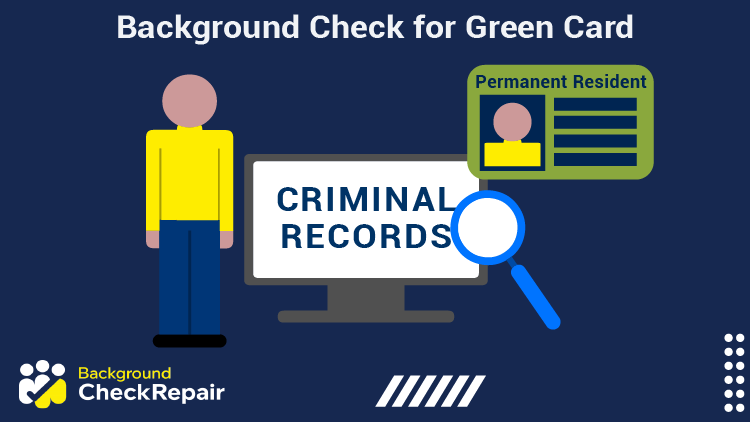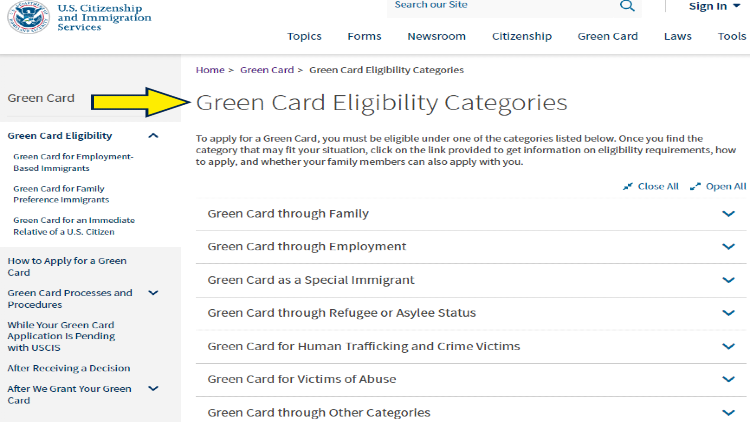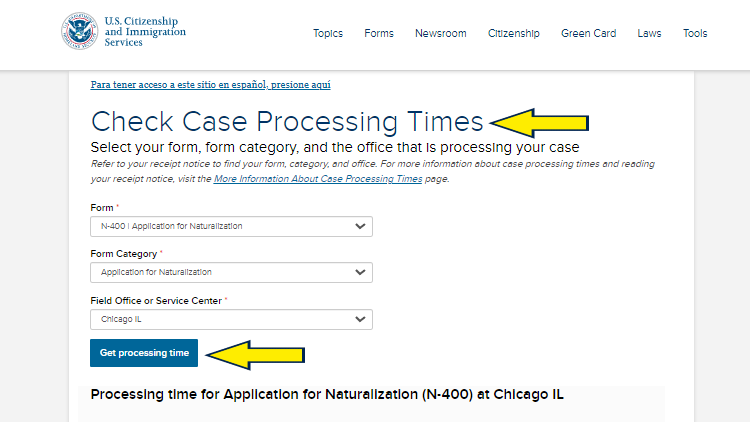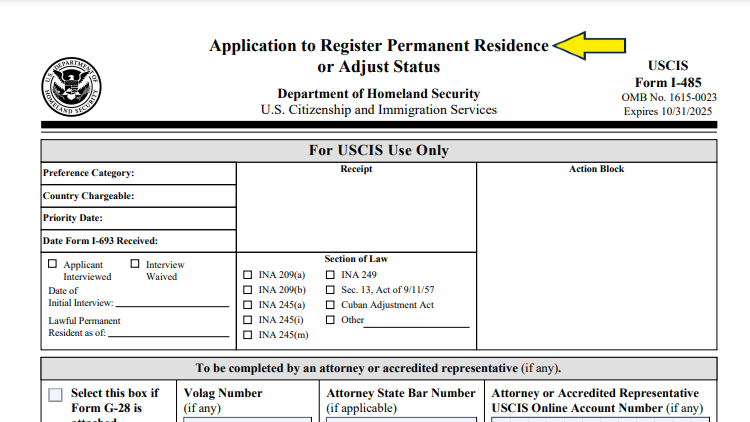What Is the USCIS Background Check After Interview?
The background check that is conducted after the initial green card interview is an FBI fingerprint check that will examine the applicant’s criminal history.
 Written by Background Check Repair
Written by Background Check Repair
Background Checks | June 7, 2024

Table of Contents
When considering a permanent move to the United States, many people are overwhelmed when trying to figure out the background check for green card process.
Understanding how to pass USCIS checks is not always as hard as it seems, but there is still a ton of information that individuals should be aware of before embarking on the long process to obtain a green card.
There are at least 25 disqualifying crimes and conditions that would cause someone to fail a USCIS check.
This complete guide explains those disqualifiers and provides a full overview of the background check for green card process.
Anyone that is not a United States citizen and wants to become one will need to obtain a green card through the United States Citizenship and Immigration Services.1
A green card, also known as a permanent resident card2 is a form that allows an individual to work and live in the United States permanently. This is different from a visa, which only allows non-citizens to live and work in the United States for a limited amount of time.
One thing that individuals should be aware of is that even though USCIS refers to a green card as allowing permanent residence in the United States, individuals must renew their green card every 10 years in order to stay in the United States.
The green card process is notoriously long and somewhat difficult to obtain. However, there is not one way to get a green card, instead, individuals should review the various ways that individuals can qualify for a green card.
One of the most well-known ways to do this is for individuals who are married to a United States citizen, however, there are plenty of other ways that individuals can speed up the process.
Some of the ways an individual could qualify for a green card are listed below.
| Immigration Type | How To Qualify |
| Family Immigration | Individuals who are relatives of a U.S. citizen or of someone who has a green card can sometimes qualify for a green card. This mostly applies to children, spouses, adopted children, and siblings. |
| Employment immigration | Individuals can obtain a green card in the U.S. for employment reasons in some cases. Generally, this will be individuals who are at the top of their professional field, high-ranking executives in multinational companies, professors and others at the top of their academic field, and those who can benefit the interests of the United States. |
| Foreign investors | Individuals who invest $500,000 or more in American businesses and generate more than 5 full-time jobs will also be eligible for a green card. |
Besides those listed above, there are several other ways that individuals can qualify for a green card, so it is best to research potential eligibility by looking through the USCIS Green Card Eligibility categories.3
One of the biggest causes for concern amongst many individuals who are seeking their green card is the required background check for a green card.
Many individuals will not be aware of what the check entails, when and where they are supposed to get the check and what kind of information is considered a disqualifier.

The U.S. Citizenship and Immigration Services agency outlines various eligible categories that can be used to obtain permanent residency in the country on the official website.
The reason that an extensive or comprehensive background check is conducted on potential immigrants is quite simple: the United States does not want to allow anyone into the United States that poses a threat to its citizens or the country itself. This means that the majority of the FBI background check4 that is performed on green card applicants is centered around their criminal history and assessing if they pose any kind of threat to the United States.
The other thing that individuals should be aware of is that there are several different kinds of background checks that are performed by various agencies.
Although many of these background checks will overlap and include the same information, using different databases and having different agencies perform the checks will create the most thorough check possible, to ensure that no one slips through the cracks due to something as simple as a clerical error.
The three background checks that every immigration applicant must undergo are as follows: IBIS check, FBI fingerprint background check, and FBI name check.
All of these checks will be discussed in detail further down.
When it comes to what causes an individual to fail this background check, it is a good idea for individuals to familiarize themselves with the following disqualifiers.12
Keep in mind that besides the list below there are other things that can cause someone to be disqualified, such as lying about a crime they committed, even if the crime does not appear on the list below.
Although many of these are fairly severe and individuals will likely know if they have been found guilty of any of the above crimes, knowing how to run a background check on yourself beforehand is almost always a great option as it will allow individuals to know exactly what is included on a background check and gives them an opportunity to do the necessary steps on how to correct errors on your background check should any mistakes appear.
Individuals can perform a background check on themselves using the search bar at the top of this page.
The background check process for obtaining a green card requires three different checks.
The first check, known as the IBIS background check7 is the initial name-based check that is run very early on in the process. This check is performed on anyone who wishes to enter the U.S. at all and is considered a fairly basic criminal background check.
The background check after green card interview, is what most individuals would consider the main background check. This is the FBI fingerprint-based check that is described above and is far more intensive than the IBIS check.
As mentioned, if fingerprints can not be taken for some reason then individuals will be required to obtain clearance letters from their local police departments instead of providing fingerprints.
The USCIS background check after N-4008 interview is where most individuals will get a good idea of their chances of obtaining a green card. This is the check where individuals are most likely to be denied a green card due to their criminal history.
After the fingerprint check has been performed, individuals will need to undergo one final USCIS background check for green card.
The check is also performed by the FBI but is a named-based check that uses information from the FBI’s National Name Check Program.9 This is the check that will take by far the longest of any of the background checks that are performed during the entire process.
Although the first two background checks will take less than a week to be completed, the FBI name check can take up to a year to complete due to the number of checks that have been backlogged.
This may seem like a long time to be waiting but, individuals should know that almost anything that would prevent an individual from obtaining their green card will be found during the first two checks.
The final check is mostly a precaution so individuals who have passed the first two checks should have very little to worry about.
Another thing that individuals should also be aware of as far as the required background checks are concerned is the checks that are required for those other than the potential immigrant themselves. Many individuals will be wondering, does USCIS do background check on petitioners, and they do.
The USCIS will perform checks on the petitioner10 because, under the Adam Walsh act,11 individuals who have been convicted of certain crimes are not eligible to petition for a relative to obtain a green card to the United States.
Keep in mind that simply having a criminal record will not cause an individual to forfeit their privilege to petition a family member for a green card. Rather, the crimes that will bar someone from doing this are mostly related to sex acts and crimes against minors.
Although the USCIS check focuses primarily on criminal history, the main thing that the check is really assessing is if the individual poses any kind of risk to the United States or its citizens. Many people will immediately think of terrorism or violent criminals, but this is not the only thing that they are looking for.
The USCIS is also looking to ensure that the individual does not pose a threat to financial institutions or the general well-being of U.S. citizens via illegal business practices.
In short, the risk of physical violence is not the only thing that the USCIS background check is looking to determine.
A common question regarding the green card process is, does USCIS check employment history for green card, and the answer is yes. The USCIS background check is not simply a criminal history check and will essentially examine any information that the FBI or USCIS is able to get their hands on.
Part of the green card application process involves individuals giving information regarding employment and their education.5
The USCIS will want to know the name of the business, address, and phone number of at least the last several years of employment for anyone applying for a green card. This is done to examine any inconsistencies or other troubling information.
Although this may seem like an unusual way to assess how much of a threat someone is, the USCIS is mainly looking to ensure the individual has not worked extensively with any company that poses a threat to the interest of the U.S. or any businesses associated with criminal activity.
In short, if the USCIS finds an applicant has worked for a company that is known for its criminal activity, this would be considered a major red flag.
When it comes to how far back does USCIS background check go, there are a few things that individuals will need to consider.
First, individuals should understand the way the background check for a green card is conducted. Unlike a pre-employment check, which often only goes back 7 years, the FBI background check will check the individual’s entire criminal history, or at least what is available to them.
Basically, anything within the FBI databases that are used to perform the checks will be on the report.
However, since the individuals undergoing this check will often have lived outside of the United States, what actually shows up on the check will vary from case to case.
The FBI fingerprint check is the main background check that most people will refer to in regard to the green card process. Although this is technically the second check, it is the only one that is not name-based, and thus the check is most likely to find criminal history information about the individual.
However, there are lots of individuals who can not be fingerprinted6 for various reasons such as skin conditions. In this case, individuals will need to go through a separate process that requires them to obtain clearance letters from the local police department for every place they have lived in the last 3-5 years, depending on the type of green card they are applying for.
This is known as a police clearance certificate. Individuals will also need to give a statement under oath regarding their criminal history.
Many individuals will be wondering, can you get a green card with a felony, although this is possible there are a few things that individuals should know.
The first is that the USCIS background check for citizenship is checking for specific crimes, rather than a certain level of crime. Since crimes are classified differently in each country, the USCIS is more interested in what the individual did, rather than what punishment the individual received.
As long as the crime does not appear on the list above, individuals should have no problem passing the background check.
Some individuals might have found themselves in trouble with law enforcement while living in the U.S. with a green card. When it comes time to renew, the question of, whether can I renew my green card with a felony, will likely be heavy on their minds.
It is difficult to say exactly what the odds are of getting your green card renewed for individuals that have a criminal history. Both misdemeanor and felony offenses carry the risk of the individual not being able to renew their green card and being forced to leave the country.
The USCIS does not have a list of crimes that will prevent someone from renewing their green card but the general rule is that the more serious the crime, the more likely it will be cause for the individual to be removed. However, individuals will be able to plead their case with an immigration judge before they are deported.
The green card background check time might seem short at first glance, especially considering that the first two checks should not take any longer than a typical federal background check. However, the final name-based FBI check is where things can start to take a long time.
When it comes to, how long does USCIS background check take, the answer will vary greatly from person to person.

The agency website allows users to check on the processing times of their green card requests.
Technically the check should take less than a month to complete but this is almost never the case. Many individuals have reported the check to take several months and others have claimed they had to wait 2 years before their check was completed.
In short, individuals should be prepared to wait a very long time.
There are several reasons for there to be a USCIS background check delay and most individuals will experience some kind of delay during the entire process. As mentioned, most of these delays will come during the FBI’s name-based check, which is the final check that is run during the green card process.
The main reason for these delays is simple backlogging as thousands of individuals apply for green cards in the United States every year.

With all government applications, official forms must be completed and submitted to the agency performing the background check and green card application.
One of the most common messages that individuals will receive when trying to check their USCIS case status is: your case is currently delayed because the required security checks are still pending.
This is nothing to worry about and is the standard message for almost any kind of I-48513 background check delay and likely means there is simply a backlog of checks, rather than a problem with their check specifically.
Any message regarding a USCIS security check pending, or something similar is no cause for concern.
The process to get a criminal background check for immigration purposes is similar to what many individuals go through when starting a new job, and will not require the individual to go to a specific place to have the check performed.
When individuals begin the green card process, all of the information regarding when and how to have the criminal background checks performed will be included, and in most cases, the USCIS will reach out to the individual with exact steps for the background check as they reach various milestones in the green card process.
The USCIS background check for employment is one of the few checks during the green card process that does not employ the use of a database.
Instead, individuals will need to provide information for their past employers such as contact information, addresses, the position that the individual held, and the dates on which the individual worked there.
This information will then be performed the way employment verification is for a typical pre-employment check.
The background check for green card may seem confusing at first glance but most of the checks require fairly minimal information on behalf of the applicant.
The main thing that individuals need to be sure of is entering all of their information accurately as even a simple mistake can appear suspicious, especially if it is in regard to someone’s criminal history.
Individuals who are hoping to immigrate to the U.S. will likely find the green card application process extremely intimidating.
However, the process is fairly straightforward and as long as individuals are well prepared, they should be able to go through the background check for green card and other related processes without too much trouble.
The background check that is conducted after the initial green card interview is an FBI fingerprint check that will examine the applicant’s criminal history.
The background check that is conducted after the I-485 interview can be viewed as the main background check and is the check that will uncover any criminal history information pertaining to the applicant.
There are three different background checks performed during the I-485 process. The first is an IBIS check, followed by an FBI fingerprint check, and finally an FBI Name check.
The immigration background check includes both name and fingerprint-based criminal history checks as well as several other checks of security databases and employment and education verification.
Individuals will not need to take any additional steps and the process to submit information for the FBI background check will be sent directly to the individual when they reach the required stage in the process.
1USCIS: Home. Retrieved December 22, 2022, from <https://www.uscis.gov/>
2Green Card. USCIS. Retrieved December 22, 2022, from <https://www.uscis.gov/green-card>
3Green Card Eligibility Categories. (2022, July 11). USCIS. Retrieved December 22, 2022, from <https://www.uscis.gov/green-card/green-card-eligibility-categories>
4A Few Moments From This Week at the White House. (2022, January 29). YouTube. Retrieved December 22, 2022, from <https://www.fbi.gov/>
5Chapter 11 – Education and Skills. (n.d.). USCIS. Retrieved December 22, 2022, from <https://www.uscis.gov/sites/default/files/document/policy-manual-resources/PMVolume8PartGChapter11_external-archive.pdf>
6Chapter 2 – Background and Security Checks. (2013, January 7). USCIS. Retrieved December 22, 2022, from <https://www.uscis.gov/policy-manual/volume-12-part-b-chapter-2>
7Audit Report. Retrieved December 22, 2022, from <https://oig.justice.gov/reports/INS/a0314/findings.htm>
8N-400, Application for Naturalization. (2022, December 14). USCIS. Retrieved December 22, 2022, from <https://www.uscis.gov/n-400>
9FBI — Our National Name Check Program. (2008, June 11). FBI. Retrieved December 22, 2022, from <https://www.fbi.gov/news/stories/2008/june/namecheck_061108>
10I-130, Petition for Alien Relative. (2022, December 12). USCIS. Retrieved December 22, 2022, from <https://www.uscis.gov/i-130>
11Adam Walsh Act. (n.d.). Department of Justice. Retrieved December 22, 2022, from <https://www.justice.gov/archive/olp/pdf/adam_walsh_act.pdf>
12Chapter 4 – Permanent Bars to Good Moral Character. (2013, January 7). USCIS. Retrieved December 22, 2022, from <https://www.uscis.gov/policy-manual/volume-12-part-f-chapter-4>
13Application to Register Permanent Residence or Adjust Status. (2022, December 13). USCIS. Retrieved December 22, 2022, from <https://www.uscis.gov/i-485>
We use cookies to ensure that we give you the best experience on our website. If you continue to use this site we will assume that you are happy with it